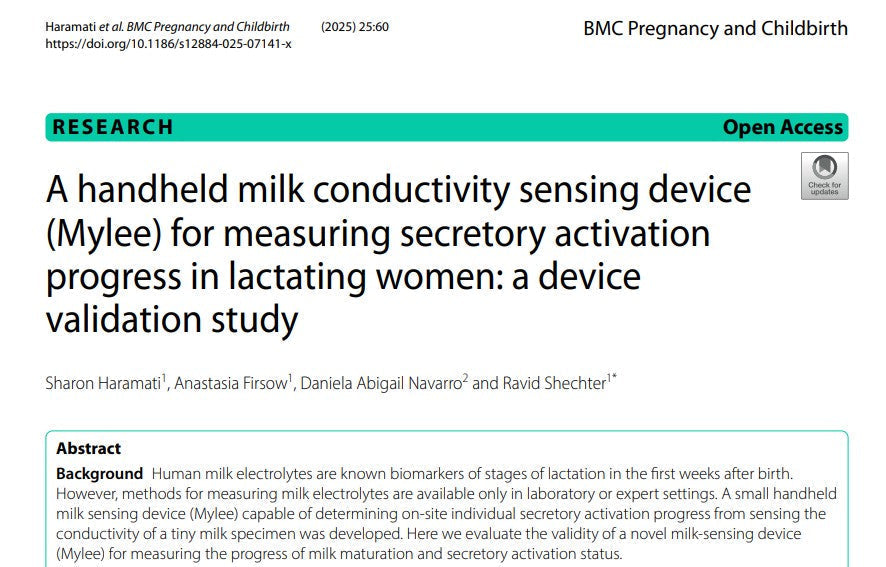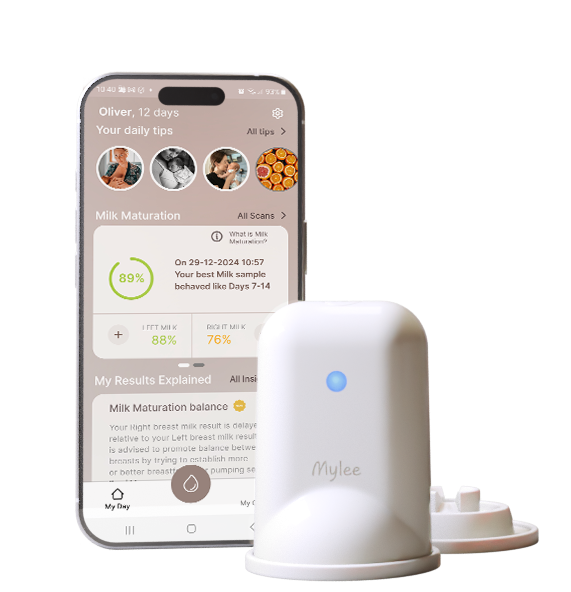In July 2025, the Academy of Breastfeeding Medicine (ABM) published a special issue of Breastfeeding Medicine dedicated to one of the most critical but often overlooked stages of lactation: the first two weeks postpartum, and particularly the first five to six days after birth. (1)
This period, known as secretory activation, marks the transition from colostrum to mature milk and the process of establishing milk volume. Research shows that timely secretory activation is strongly linked to long-term breastfeeding success. When it is delayed or impaired, mothers are more likely to stop breastfeeding earlier than intended.
This issue’s open access to all readers was enabled by support from Medela, a global leader in breastfeeding support products and breastfeeding and Mother's milk related research and development. Medela's Medical affairs and Medical research departments supported this open access special issue so readers can benefit from this groundbreaking research.
Medela’s professionals have addressed the scientific content and clinical applications in depth (3,4)
"What makes this research in this special issue particularly powerful is how it combines cutting-edge technology with deep understanding of the challenges mothers face. The researchers explore how breastfeeding medicine specialists can use new point-of-care measurements to objectively diagnose delayed or impaired secretory activation. One of the most exciting developments is the use of special probes to measure sodium in breast milk—a simple test that can tell clinicians whether a mother’s milk production is on track" (3)
Why the First 5–6 Days Matter
The special issue emphasizes three key points:
- Early detection is vital. Most early weaning is linked to insufficient milk supply, yet there have been few tools to objectively measure whether supply is truly on track.
- Screening helps both at-risk and thriving dyads. Identifying mothers and infants who need extra support is just as important as reassuring those who are progressing normally, so they can be proactive and get back on track sooner with less efforts.
- Biomarkers can guide personalized care. One of the most promising developments is the use of sodium levels in breast milk as a biomarker to track lactation progress. Elevated sodium can indicate delayed secretory activation that may harm building milk supply.
"In particular, this research demonstrates that the first 5 days are crucial for the effective initiation of lactation, timely secretory activation, and achieving a full milk volume, which in turn, influences subsequent long-term lactation outcomes. Creating clear care plans for mothers with lactation risk factors is key to offering better, evidence-based lactation support, intervention, and care." (3)
From Research to Real Life
This shift in focus-from treating problems later to monitoring milk biochemistry early-represents a new era in breastfeeding support. The ABM special issue calls for integrating these approaches into both NICU protocols and care for healthy, full-term infants.
For mothers, it means:
- Timely reassurance when everything is on track.
- Early guidance if more support is needed.
- Personalized care instead of one-size-fits-all recommendations.
"Here's where the innovation truly shines: the use of biomarkers, specifically sodium levels in milk, to track lactation progress. This enables us to provide mothers with real-time, individualized feedback. No more one-size-fits-all".."We must integrate this evidence into NICU protocols, nursing education, and our conversations with every mother we support”...."This study offers a path toward empowerment. By removing the guesswork and providing targeted recommendations, we empower mothers to take control of their lactation journey”...“By removing the guesswork and providing targeted recommendations, we empower mothers to take control of their lactation journey”(4)
From NICUs to Living Rooms
While much of the global conversation around milk biomarkers has focused on preterm babies and NICUs, this research is just as relevant for mothers of full-term, healthy newborns. Every mother deserves to get a better start and feel confident in her milk supply.
What was once limited to research labs and NICUs is now available for everyday mothers at home.
MyLee in the Spotlight
Within this series, Bookhart et al. (2025) reviewed new point-of-care techniques for identifying risks of early lactation cessation (2). The MyLee Milk Sensing Device was highlighted as a novel solution that enables biomarker testing at home.
With just a few drops of milk, even colostrum, easily from home, MyLee patented technology measures milk conductivity as a proxy for sodium and other electrolytes, providing real-time insights into whether secretory activation and milk production progressing are as expected.
Personalized Support for Every Mom - Turning Doubt Into Confidence
Every breastfeeding journey is unique. Some moms may need to offer the breast more, or add hand expression or pump. Breastfeeding medicine issue relate to it in the context of personalized pumping routines in the NICU, some moms may need to pump six times a day, others eight. Generic, one-size-fits-all advice often doesn’t fit-and can even add stress.
By giving professionals and mothers data about individual milk biochemistry, MyLee allows for personalized recommendations. That means:
- targeted guidance instead of vague advice,
- allow for early interventions when needed,
- and reassurance when everything is progressing smoothly.
It’s not about adding pressure. It’s about removing doubt
Because when mothers feel supported, babies thrive-and that’s what truly matters.
"Since the most common reason moms stop breastfeeding earlier than they want to is perceived insufficient milk supply, it’s important to improve screening for the initiation of lactation, also known as secretory activation. Better screening can help identify moms and babies who might need extra support early on, and also reassure those whose milk supply is developing well" (3)
References
- Academy of Breastfeeding Medicine. Breastfeeding Medicine. Special Issue: Early, Unplanned Cessation of Lactation in Healthy and At-Risk Dyads: Priorities for Research and Practice. July 2025. Link
- Bookhart, S. “Point-of-Care Techniques to Identify Risks for Early, Unplanned Lactation Cessation.” Breastfeeding Medicine. July 2025. Link
- “Understanding Early Weaning: New Insights from Breastfeeding Medicine’s July 2025 Special Issue.” Medela scientific knowledge notes for lactation professionals. Link
- “Revolutionizing Lactation Care in the NICU: A New Era of Evidence-Based Empowerment for Mothers.” Written by Angela Lang in Medela scientific knowledge notes for lactation professionals. Link







Leave a comment
All comments are moderated before being published.
This site is protected by hCaptcha and the hCaptcha Privacy Policy and Terms of Service apply.